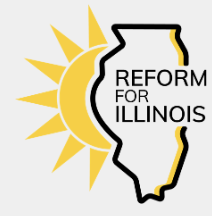Ranked Choice Voting
Let’s improve Chicago elections! LWV Chicago is fighting to establish Ranked Choice Voting (RCV) system for municipal elections in the City of Chicago.
What’s the problem?
Chicago currently has “two-round” municipal elections. If no one receives more than 50% of votes in the first round, the Municipal General Election, the top two vote-getters advance to a second-round Runoff Election.
When faced with the possibility of a Runoff, first-round votes can be seen as “wasted” on a candidate who doesn’t have a chance to make it to the Runoff. Polling and other information may indicate to voters that their favorite candidate is doomed to lose, so it is a “waste of time” to vote at all.
Under our current voting system, a candidate can win without support from a majority of voters. With Ranked Choice Voting, candidates need to earn support from a majority (50% + 1) of voters in order to win.
When an election system gets results that don’t represent voter views, voters are discouraged, and voter turnout suffers.
How does Ranked Choice Voting work?
Voters rank the candidates on their ballot.
If one candidate wins more than 50% of the first-choice votes, they win! If not…
The candidate with the fewest first choice votes is eliminated, and the second choice of the voters choosing that candidate are elevated to their first choice. Then votes are counted again.
If a candidate now has more than 50% of the first-choice votes, counting ends and a winner can be announced. If not, this process continues until someone has the support of more than 50% of voters.
RCV minimizes strategic voting.
With Ranked Choice Voting, voters can confidently cast their ballot for their favorite candidate, knowing that if that candidate performs poorly, their vote counts towards their designated backups.
RCV saves time and money.
There would be no need for a Runoff, and voters would not have to return to the polls. Chicago would not have to spend millions of dollars on rented space, election workers, equipment transport, postage, etc. for a new round of voting.
Candidates also wouldn’t need to spend so much money to attract attention. Voters would be incentivized to look a wider range of candidates because they would have to think about who to rank second, third, and so on.






